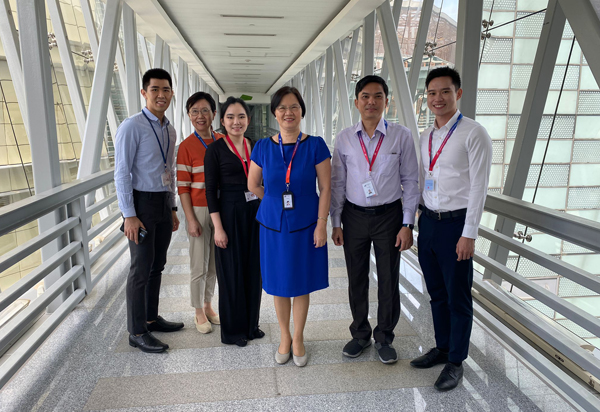News
SINGAPORE-DEVELOPED CANCER IMMUNOTHERAPY OFFERS NEW HOPE FOR LATE-STAGE CANCER PATIENTS
09 May 2025

Prof Zeng Qi's research team.
MEDIA RELEASE
SINGAPORE-DEVELOPED CANCER IMMUNOTHERAPY OFFERS NEW HOPE FOR LATE-STAGE CANCER PATIENTS
PRL3-zumab demonstrates safety and clinical benefit in FDA-approved Phase II trial across multiple cancer types
PRL3-zumab demonstrates safety and clinical benefit in FDA-approved Phase II trial across multiple cancer types
SINGAPORE — Researchers from A*STAR Institute of Molecular and Cell Biology (A*STAR IMCB) and local biotechnology company Intra-ImmuSG have announced promising outcomes from a Phase II clinical trial of a novel cancer immunotherapy, PRL3-zumab. Published in Cell Reports Medicine, the study shows PRL3-zumab safely slows disease progression in patients with advanced solid cancers unresponsive to existing treatments.
PRL3-zumab is a novel humanised antibody therapy uniquely designed to target PRL3, an intracellular protein highly expressed in about 80% of solid tumours but absent in healthy tissues. Unlike conventional antibodies that only engage surface proteins, PRL3-zumab identifies cancer cells by targeting PRL3 when it transiently appears on the cell surface, flagging them for the immune system to attack and destroy through processes known as antibody-dependent cellular cytotoxicity and phagocytosis.
This targeted antibody-based strategy represents new hope for patients with aggressive, treatment-resistant cancers, including those who have previously exhausted standard immunotherapy options. One patient in the trial with Stage IV gastric cancer experienced disease stabilisation for over 13 months. In comparison, patients receiving existing treatments after standard therapies typically see disease progression in about 2 months—highlighting PRL3-zumab’s potential to significantly improve patient outcomes.
While this US trial focused primarily on preventing disease progression, encouraging tumour shrinkage has been observed in other ongoing trials in Malaysia and China, suggesting PRL3-zumab’s broader potential. Full results from these studies are currently being analysed and expected to be published next year.
The Phase II trial enrolled 51 patients with various advanced-stage solid cancers. PRL3-zumab demonstrated a favourable safety profile, with no serious drug-related side-effects reported. The trial employed a novel analytical method called the Single Evaluable Patient Single Cohort (SEPSC) design, rigorously comparing each patient's progression-free survival on PRL3-zumab against their previous treatments and historical benchmarks.
What makes PRL3-zumab particularly groundbreaking is its ability to target intracellular proteins that have long been considered "undruggable" by antibodies. This previously unexplored strategy in cancer treatment could potentially open new avenues for immunotherapy approaches, offering a viable "rescue therapy" for patients who do not respond to existing treatments.
From Laboratory Discovery to Clinical Application
PRL3-zumab's journey began at A*STAR IMCB under Professor Qi Zeng, who first identified PRL3 in 1998, recognising its role in cancer metastasis and resistance. Professor Zeng's research laid the foundation for the development of PRL3-zumab and led to the establishment of Intra-ImmuSG, an A*STAR spin-off company, to advance the therapy clinically.
PRL3-zumab's journey began at A*STAR IMCB under Professor Qi Zeng, who first identified PRL3 in 1998, recognising its role in cancer metastasis and resistance. Professor Zeng's research laid the foundation for the development of PRL3-zumab and led to the establishment of Intra-ImmuSG, an A*STAR spin-off company, to advance the therapy clinically.
The Phase II trial enrolled 51 patients with various advanced-stage solid cancers. PRL3-zumab demonstrated a favourable safety profile, with no serious drug-related side-effects reported. The trial employed a novel analytical method called the Single Evaluable Patient Single Cohort (SEPSC) design, rigorously comparing each patient's progression-free survival on PRL3-zumab against their previous treatments and historical benchmarks.
What makes PRL3-zumab particularly groundbreaking is its ability to target intracellular proteins that have long been considered "undruggable" by antibodies. This previously unexplored strategy in cancer treatment could potentially open new avenues for immunotherapy approaches, offering a viable "rescue therapy" for patients who do not respond to existing treatments.
"PRL3-zumab represents a true bench-to-bedside success story. This research product has already benefited many late-stage cancer patients and offers new hope to those with rare, aggressive cancers, helping to extend both survival and quality of life in patients who had run out of options," said Professor Qi Zeng, Senior Principal Scientist, A*STAR IMCB; and Founder and Chief Scientific Officer, Intra-ImmuSG Pte Ltd.
Study citation: Park, D.J., Thura, M., Chiu, V.K. et al. The PRL3-zumab paradigm: A multicenter, single-dose-level phase 2 basket clinical trial design of an unconventional cancer immunotherapy. Cell Reports Medicine (2025).
Study citation: Park, D.J., Thura, M., Chiu, V.K. et al. The PRL3-zumab paradigm: A multicenter, single-dose-level phase 2 basket clinical trial design of an unconventional cancer immunotherapy. Cell Reports Medicine (2025).
A*STAR celebrates International Women's Day

From groundbreaking discoveries to cutting-edge research, our researchers are empowering the next generation of female science, technology, engineering and mathematics (STEM) leaders.
Get inspired by our #WomeninSTEM
.png?sfvrsn=c3edc68e_6)